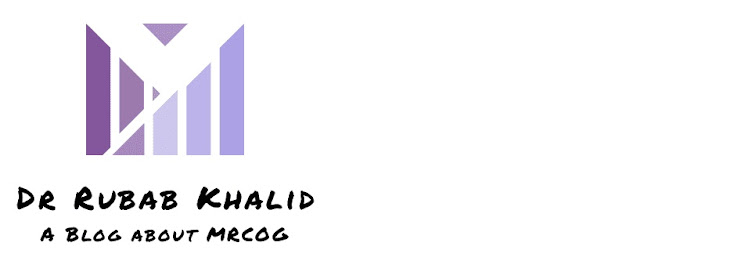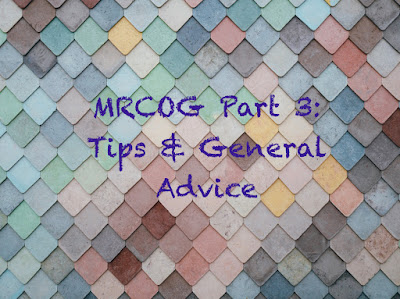I am Dr Rubab Khalid from Pakistan. I passed my MRCOG Part 3 exam in September 2018 and have been guiding MRCOG Aspirants since then. I would like to share some tips and general advice for the part 3 exam, which I think could be helpful before embarking upon the last part of the MRCOG exam.
Understand the exam:
The starting point for exam preparation is to understand what is expected from you in this exam and that is “competent ST5 level according to RCOG curriculum”. How to know about this? The answer is very simple. Just visit the MRCOG part 3 section on the RCOG website & go through all the details given in 14 Modules. Explore and understand all five domains. It is very clearly mentioned what is required in each domain in each module. All domains are essential, but patient safety comes at the top as this domain is checked in all 14 stations. You need to show that you are an honest, trustworthy & safe doctor.
This exam tests your knowledge, skills & attitude. Remember it's a UK-based exam & you need to prepare yourself according to those standards, no matter which level you are working in your practical life. Understanding UK systems is essential.
The mindset for this exam is very different from Part 2. If you passed Part 2, you have already proved that you have the required theoretical knowledge. All you now need is to demonstrate & show how you apply this knowledge and communicate in your clinical practice.
Planning the exam:
Once you pass Part 2, plan well ahead with good preparation, keeping in mind your own personal & professional circumstances. Do not attempt the exam just for the sake of experience. This part is a bit different as it has some additional requirements like choosing an exam centre, visa hassles, travel, accommodation, financial constraints, work leave-related issues & leaving your family for some time. But the fact is that almost all of us have to face this and just take it as a part of the exam preparation. The reward is definitely worth the effort.
Preparing for the exam:
- Decide how are you going to approach the preparation. Are you a techno person who prefers the latest gadgets or paper-based material? In this world of the internet, it is a must that we all be familiar with basic/advanced technical stuff to keep ourselves updated. Especially in this part of exam, you can use the technology in a very positive way (practising with your study buddy online or in case you don't have a study buddy you can record your own performance in the voice clip & listen to it later which will help you pick up missed points to improve)
- Collect the required study material which includes books (hard or soft copy), patient information leaflets, previous exam/course recalls, videos, guidelines, your notes for part 2 etc.
- Organise the material in a way that is accessible to you whenever you need it for example in your mobile/tab you can make folders for 14 modules and keep adding materials to it as you come across additional stuff.
- Study buddy: This is important for this exam as part 3 is all about communication, conversation & speaking. Choose your buddy smartly with whom you have compatibility, and who is serious and committed or else it could result in disaster :)
- Time: It might not be possible to give dedicated time keeping in mind our busy lives. Here I would suggest whatever free time you can avail, you should. Once you decide to go for the exam, do something every day about it no matter how little. This is the secret to crack this exam. It is important to have a good command of English. In your free time, you can watch BBC, English movies, dramas or documentaries.
- Notes & Templates: They are not required in detail like part 2, but you should make your own history templates at least a general one for Obstetrics & one for Gynaecology. Note down a few counselling points for different scenarios with simple & appropriate sentences. It is helpful to make a general flash card for each module. Do go through the important points in the guidelines. Patient information leaflets are the best source to learn layman's terms to avoid medical jargon. Wordings you use in this exam are very important.
- Practise: Quality of practice is more important than quantity. Keep practising whenever you can get the chance be it in your hospital, car or home. If no one is available, you can talk in front of the mirror or record a voice clip on mobile which may help you know about your timing of stations.
- Guidance: It's a MUST to have someone qualified, sincere and dedicated to guiding you on the right path for part 3. There are many options available to choose from. It could be a colleague, your consultant or an online mentor. This is the most important decision which will affect the outcome of your exam.
Courses: A BIG QUESTION
- No course can ever guarantee 100% success.
- The only standard course is RCOG which is now being conducted outside UK as well. All the information is available on the RCOG website.
- It's worth taking 1-2 courses for this exam, especially for overseas candidates for orientation but choose wisely. It is a good option if you can attend a course in the UK before the exam which will help you to get familiar with and understand the UK systems.
- There are many online courses available. Here I would suggest being very careful in selection before spending your hard-earned money. You must consider cost-effectiveness, quality, previous feedback and all the pros & cons. Keep in mind that everyone has different feedback for the same course as it's purely a personal experience. You can learn SOMETHING from any course if you are receptive to learning.
Around the exam time:
- Time your travel so that you can adapt to the timezone & be able to adjust your body clock before the exam day.
- Plan each day of your stay well before time, so you don't have to make last minutes adjustments. Know about the weather, your accommodation, transport means and food.
- Take adequate rest and sleep well before the exam day.
- Reach the exam centre in time.
- Keep Calm, Be Confident, and Trust yourself.
- Just follow the basic rules of consultation. It is just testing how well you converse with the others. Keep it as natural as possible. Listen carefully. Involve the other person. Be prepared for ANY situation and deal with it as you would in your real life. Deal with the role-player holistically and not just the problem.
- These above tips may seem very basic and have been repeated in almost all the bits of advice, but trust me we have to consider all these basics as a means of stress relief.
- After the exam, make sure to enjoy it a bit regardless of how the exam went. You deserve it after a backbreaking effort just to sit for the exam :)
Thanks for sparing your valuable time to read this.
I wish you all the very best.
Dr Rubab Khalid


Very valuable and comprehensive guidelines for those planning to take MRCOG Part 3...
ReplyDeleteAppreciate your efforts in sharing your experience with others and giving them important insight to the exam...
Thanks for appreciation & encouragement.
ReplyDeleteHow many months preparation required?
ReplyDeleteIt should take 8-12 wks of dedicated time.
DeleteIs it very tough to pass the exam?
ReplyDeleteHaving good clinical skills could be enough ?
I do not say it’s very tough. Every exam requires a targeted and focused approach. Good clinical skills are important but for part 3 good communication skills are more important.
ReplyDeleteIts a great help Thankyou
ReplyDelete